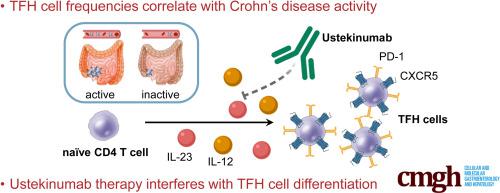Cellular and Molecular Gastroenterology and Hepatology ( IF 7.1 ) Pub Date : 2020-07-15 , DOI: 10.1016/j.jcmgh.2020.07.005 Anna-Maria Globig 1 , Nikola Patricia Sommer 2 , Katharina Wild 2 , Josefine Schardey 2 , Katharina Zoldan 2 , Anne Kerstin Thomann 3 , Lucas-Alexander Schulte 4 , Rupert Schreiner 5 , Wolfgang Reindl 3 , Jochen Klaus 4 , Christoph Mathis Schempp 6 , Maike Hofmann 2 , Robert Thimme 2 , Tobias Boettler 2 , Peter Hasselblatt 2

|
Background & aims
The pathogenesis of chronic inflammatory bowel diseases (Crohn’s disease [CD] and ulcerative colitis) involves dysregulated TH1 and TH17 cell responses, which can be targeted therapeutically by the monoclonal antibody Ustekinumab directed against the joint p40 subunit of IL-12 and IL-23. These cytokines may also regulate the differentiation of T follicular helper (TFH) cells, which promote B cell function in germinal centers. However, the role of TFH cells in CD pathogenesis and impact of Ustekinumab therapy on TFH cell fate in patients are poorly defined.
Methods
Lymphocytes were isolated from peripheral blood (n=45) and intestinal biopsies (n=15) of CD patients or healthy controls (n=21) and analyzed by flow cytometry to assess TFH cell phenotypes and functions ex vivo. In addition, TFH cell differentiation was analyzed in the presence of Ustekinumab in vitro.
Results
TFH cell frequencies in the intestine as well as peripheral blood were associated with endoscopic as well as biochemical evidence of CD activity. CD patients with clinical response to Ustekinumab, but not those with response to anti-TNF antibodies, displayed reduced frequencies of circulating TFH cells in a concentration-dependent manner while the TFH phenotype was not affected by Ustekinumab therapy. In keeping with this notion, TFH cell differentiation was inhibited by Ustekinumab in vitro while TFH cell maintenance was not affected. Moreover, Ustekinumab therapy resulted in reduced germinal center activity in CD patients in vivo.
Conclusions
These data implicate TFH cells in the pathogenesis of CD and indicate that Ustekinumab therapy affects TFH cell differentiation, which may influence TFH-mediated immune functions in UST-treated CD patients.
中文翻译:

Ustekinumab 抑制克罗恩病患者的 T 滤泡辅助细胞分化。
背景与目标
慢性炎症性肠病(克罗恩病 [CD] 和溃疡性结肠炎)的发病机制涉及 TH1 和 TH17 细胞反应失调,可以通过针对 IL-12 和 IL-23 的联合 p40 亚基的单克隆抗体 Ustekinumab 进行治疗。这些细胞因子还可以调节 T 滤泡辅助 (TFH) 细胞的分化,从而促进生发中心的 B 细胞功能。然而,TFH 细胞在 CD 发病机制中的作用以及 Ustekinumab 治疗对患者 TFH 细胞命运的影响尚不清楚。
方法
从 CD 患者或健康对照 (n=21) 的外周血 (n=45) 和肠活检 (n=15) 中分离淋巴细胞,并通过流式细胞术进行分析,以评估 TFH 细胞表型和体外功能。此外,在体外存在 Ustekinumab 的情况下分析了 TFH细胞分化。
结果
肠道和外周血中的 TFH 细胞频率与内窥镜和 CD 活性的生化证据有关。对 Ustekinumab 有临床反应的 CD 患者,而不是对抗 TNF 抗体有反应的 CD 患者,以浓度依赖性方式显示循环 TFH 细胞频率降低,而 TFH 表型不受 Ustekinumab 治疗的影响。与这一观点一致,在体外Ustekinumab 抑制了 TFH细胞分化,而 TFH 细胞维持不受影响。此外,Ustekinumab 治疗导致 CD 患者体内生发中心活性降低。
结论
这些数据暗示 TFH 细胞参与 CD 的发病机制,并表明 Ustekinumab 治疗会影响 TFH 细胞分化,这可能会影响 UST 治疗的 CD 患者中 TFH 介导的免疫功能。










































 京公网安备 11010802027423号
京公网安备 11010802027423号